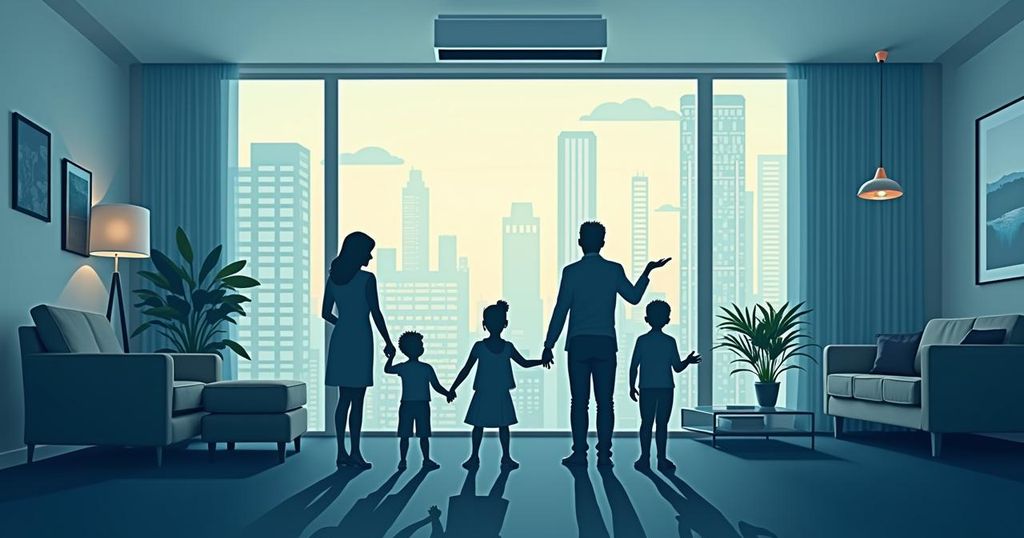Air conditioning is a vital technology that has fostered global development, especially in hot regions. However, its accessibility remains limited, with only 8 percent of those in the hottest areas having AC. This lack of cooling exacerbates productivity loss and heat-related deaths. With rising temperatures, the demand for AC is predicted to soar, accompanied by increased energy consumption and emissions. While critics caution against the moral implications of widespread AC use, improving energy efficiency in cooling technologies presents a balanced approach to address both health needs and environmental concerns.
Air conditioning (AC) has profoundly influenced global cities, enabling their growth and development, particularly noticeable in climate-challenged regions like Singapore and Dubai. The inception of artificial cooling has played a pivotal role in the expansion of the Sun Belt in the United States, contributing to the foundation of various sectors crucial to the global economy, including manufacturing and information technology. Despite its significance, access to air conditioning remains appallingly low in the hottest areas of the world, with impactful statistics revealing that a mere 8 percent of the 2.8 billion individuals in these regions have AC in their homes. For instance, the International Energy Agency (IEA) reported that only 5 percent of Indian households were fitted with air conditioning in 2018, while the ratios in South Africa and Indonesia stood at 6 percent and 9 percent, respectively. Critics from the environmental sector may view the wide proliferation of air conditioning as a moral failing that reflects humanity’s ongoing struggle with overconsumption, a sentiment echoed by Pope Francis regarding humanity’s failure to reduce detrimental habits that harm the planet. However, extreme heat presents a formidable barrier to socioeconomic progress, inhibiting productivity, decreasing national income, and driving up mortality rates, as evidenced by a 68 percent increase in heat-related deaths over the past two decades, culminating in about 12,000 fatalities annually. Adequately managed, air conditioning has the potential to significantly reduce these statistics, as seen in the United States, where mortality from excessive heat decreased due to the widespread adoption of AC. For nations like India and Indonesia, where the urban population heavily relies on cooling technology, it becomes a pressing necessity rather than a luxury. With escalating temperatures attributed to climate change, the world faces a dire projection of increased air conditioning prevalence, with numbers expected to rise to 5.5 billion units by 2050 from the current 2.3 billion. Yet, this growth presents a dual challenge; not only will the demand for energy soar, thrusting carbon emissions to new heights, but air conditioning usage currently consumes roughly 7 percent of global electricity. Data suggests that as AC units become commonplace, emissions could triple by mid-century. Furthermore, with this year poised to break heat records, realistic perspectives indicate possible global temperature increases of up to 3 degrees Celsius by 2100, heightening the risk of severe heat events in urban areas, with cities like Delhi enduring upwards of 140 days of extreme heat. Therefore, addressing climate change effectively cannot entail relegating billions of people to endure extreme heat. A morally sound approach to these challenges must include expanding access to essential air conditioning technology. Improving energy efficiency in these units can mitigate the energy demand; the IEA suggests that boosting AC efficiency could lower energy needs by 45 percent by 2050, thereby balancing the need for cooling while striving to protect the environment.
The discourse surrounding air conditioning underscores its critical role in facilitating urbanization and economic development in regions markedly impacted by high temperatures. While AC has significantly improved living conditions, particularly in developed countries, its unequal distribution raises concerns about environmental sustainability and equity. The projected increase in global temperatures due to climate change intensifies the need for adaptation strategies, including the implementation of air conditioning in developing nations that lack adequate cooling solutions. Despite the environmental implications associated with increased energy consumption from AC units, advancements in technology and efficiency present viable pathways for mitigating these impacts while addressing human health and productivity needs in a warming world.
Air conditioning is not merely an urban convenience; it is an essential service that directly influences human health, productivity, and socioeconomic development, especially in the hottest climates. As the world confronts the dual challenges of climate change and inequality, ensuring equitable access to energy-efficient cooling technologies emerges as a moral imperative. Improvements in AC efficiency and the thoughtful deployment of technology can alleviate the adverse effects of extreme heat while minimizing carbon emissions, thus harmonizing the need for economic growth with environmental responsibility.
Original Source: www.washingtonpost.com







